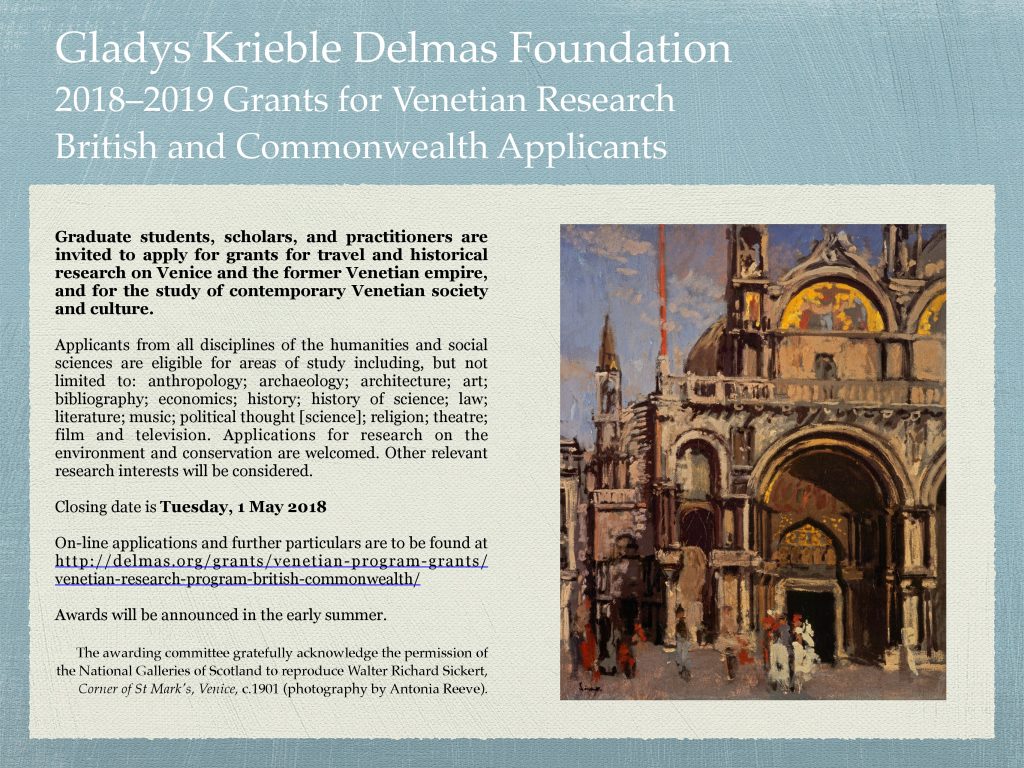
Venetian Research Programme:
British and Commonwealth Applicants
The Gladys Krieble Delmas Foundation – British and Commonwealth Committee – announces its 2018-2019 programme of grants for study based on travel to and research in Venice and the Veneto and other territories of the former Venetian Republic.
Grants will be awarded for historical research on Venice and its empire, and for the study of contemporary Venetian society and culture. Applicants from all disciplines of the humanities and social sciences are eligible for areas of study including, but not limited to: anthropology; archaeology; architecture; art; bibliography; economics; history; history of science; law; literature; music; political thought; religion; theatre; film and television. Applications for research on the environment and conservation are welcomed. Other relevant research interests will be considered.
The application deadline for the British and Commonwealth Programme is 1st May 2018.
Applications should be submitted online at http://delmas.org/grants/venetian-program-grants/venetian-research-program-british-commonwealth/
The awards will be announced by the early summer.
Eligible applicants must:
- Be citizens or permanent residents of Great Britain or the Commonwealth, and/or be enrolled for research at a British or Commonwealth university, and/or be permanent or affiliated members of a British or Commonwealth university. Experienced curatorial or conservation staff at British or Commonwealth galleries and museums are also welcome to apply.
- Have experience of research at graduate level or equivalent. If a doctoral student, to have fulfilled all doctoral requirements before completion of the thesis.
Grants for the maximum amount – normally £5000.00 – are rarely awarded. Funding is granted primarily for transportation and accommodation, but additional research expenses may also be considered. Scholars who have already received and accepted a Delmas grant are eligible to apply for grants, normally for one month, to continue the work related to the previous grant, focused on Venetian material in libraries, archives, museums or galleries outside Venice. Applicants must not submit for funding for both grants within the same year.
Applicants must notify the Committee immediately upon receipt of any other grant for research in the same area.
Any person who has accepted three or more Delmas grants for Venetian research (regardless of amount or timing) will be ineligible for consideration for two programme years after the previous grant. Thereafter, the two-year hiatus continues to apply after each grant.
All successful applicants must submit a report to the Chairman within three months of completing their funded period of research. Failure to do so will render applicants ineligible for future Delmas funding.
How to apply
The Foundation is now using a two-step online application form.
Step 1: Register by providing your contact information and creating a login.
Step 2: Fill in the online application. After your application has been submitted, you may log in to monitor the arrival of your Letters of Recommendation. Make sure you have given your referees ample notice of your intention to apply and the nature of your research.
. . Category: Archived Funding . Tags: Art History, Award, Delmas, English and Humanities, film, Funding, History of Art, television, theatre, Venetian, Venice

